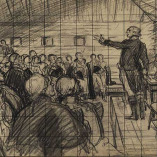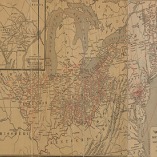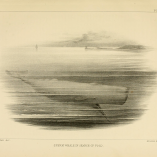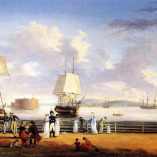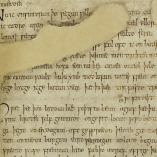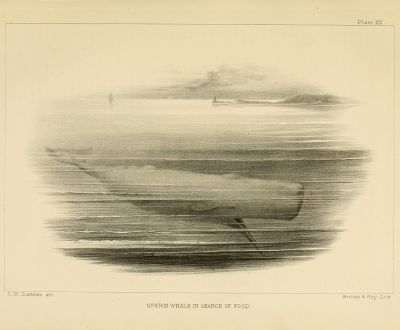
Illustration: Sperm Whale in Search of Food, by C.M. Scammon, 1874. Wikimedia Commons.
“There’s nothing more extraordinary than the world we live in,” says Elizabeth Kolbert in this week’s episode of The World in Time. “We are extremely tied up as humans for whatever reason. We have obviously evolved to pay a lot of attention to our fellow humans. But if we look beyond that, even for an instant, we see that the world is an absolutely amazing place. We are surrounded by species that all have long and rich evolutionary histories. They also have extraordinary talents that we can only appreciate by actually learning something about them. That parasitic wasp—it’s just another sort of pesky wasp or whatever. But if you delve into its life cycle, you find that every species has its own form of genius.”
This week on the podcast, Donovan Hohn speaks with Elizabeth Kolbert—New Yorker staff writer and Pulitzer Prize–winning author of The Sixth Extinction—about her new book, Life on a Little-Known Planet: Dispatches from a Changing World, which introduces us to a bestiary of creatures and to a gallery of natural scientists, and transports us to points remote, from the Arctic to New Zealand. Kolbert shares the stories and the thinking behind the field trips that the book collects, dwelling at length on “Talk to Me,” her 2023 New Yorker piece for which she joined the cetologists using machine learning to decipher—or so they hope—the communications of whales. The episode concludes with Kolbert’s firsthand account of a sperm whale’s birth, a scene that calls to mind Melville’s own visit to a whale nursery in “The Grand Armada,” chapter 87 of Moby Dick.
WORKS CITED
(In order of mention.)
Elizabeth Kolbert. The Sixth Extinction: An Unnatural History. New York: Holt Paperbacks, 2024.
Elizabeth Kolbert. Life on a Little-Known Planet: Dispatches from a Changing World. New York: Crown, 2025.
Roger Payne. Songs of the Humpback Whale. Capitol Records, 1970.
Elizabeth Kolbert. Field Notes from a Catastrophe: Man, Nature, and Climate Change. New York: Bloomsbury, 2015.
Elizabeth Kolbert. “The Climate of Man,” The New Yorker, April 18, 2005.
Climate. Lapham’s Quarterly, Fall 2019.
Lewis H. Lapham. “Paying the Piper,” Lapham’s Quarterly, Fall 2019: Climate.
Barry Lopez. Arctic Dreams. New York: Vintage Books, 2001.
Annie Dillard. Pilgrim at Tinker Creek. New York: Harper Perennial, 2013.
David L. Wagner. Caterpillars of Eastern North America: A Guide to Identification and Natural History. Princeton: Princeton University Press, 2005.
Herman Melville. Moby-Dick: A Norton Critical Edition. Edited by Hershel Parker. New York: W.W. Norton & Company, 2017.
Elizabeth Kolbert. “Talk to Me: Can artificial intelligence allow us to speak to another species?” The New Yorker, September 4, 2023.
Arthur C. Clarke. Dolphin Island: A Story of the People of the Sea. New York: Holt, Rinehart, and Winston, 1963.
Rachel Carson. The Sea Trilogy: Under the Sea-Wind, The Sea Around Us, The Edge of the Sea. New York: Library of America, 2021.
Rachel Carson and Dorothy E. Freeman. Always, Rachel: The Letters of Rachel Carson and Dorothy Freeman, 1952-1964: An Intimate Portrait of a Remarkable Friendship. Edited by Martha Freeman. Boston: Beacon Press, 1994.
Pratyusha Sharma et al. “Contextual and combinatorial structure in sperm whale vocalisations,” Nature Communications, May 7, 2024.
Thomas Beale. The Natural History of the Sperm Whale. To Which Is Added, a Sketch of a South-Sea Whaling Voyage. London: J. Van Voorst, 1839.
Herman Melville. “Chapter 87: The Grand Armada.” In Moby-Dick: A Norton Critical Edition. Edited by Hershel Parker. New York: W.W. Norton & Company, 2017.
Roger Allers and Rob Minkoff, directors. The Lion King. Walt Disney Feature Animation, 1994.

